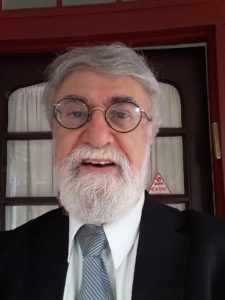For Emanuel Aronson Rund, being behind the camera is his way of fulfilling tikkun olam.
He got his start in Jerusalem, where he grew up, working with Israel’s first broadcast television station in the 1960s. He continued working for the station in New York, where he also taught film courses.
He was commissioned to make short films for medical colleges as well as films about culture in America for the United States Information Agency.

He’s dedicated himself to causes of equal rights and social justice. He’s worked with the late Lubavitcher Rebbe, Rabbi Menachem Mendel Schneerson, while in New York.
But soon he realized he had an even higher calling.
“I decided to commit myself to aid Holocaust survivors, to liberate them from their stories, personal stories, that they kept close to their hearts,” he said.
It was personal, as his German parents both lost family in the Holocaust. His father lost his first wife and a child.
“I thought at some point my father wanted me — after what he lost — he wanted me to be involved with it, possibly to, so to say, fight back whatever I could, and to commemorate, tell the stories of the Holocaust,” he said by phone in Philadelphia, where he is looking to work on new projects.
He worked on two films with Elie Wiesel, including one where he filmed the late survivor meeting kids in Spanish Harlem.
In 1985, he went with a group of survivors to Leer, Germany, which had invited the Jews of the town from all over the world to visit their hometown after 50 years. This, too, was personal as it was where his mother and uncle were from, and his grandfather, Joseph Wolffs, had been the rabbi.
But perhaps the most well-known of his hundreds of films is his 1990 documentary, Alle Juden Raus! (All Jews Out!), which highlighted Goppingen, Germany from 1933 through 1945 with a focus on the German-Jewish Auerbacher family.
Inge Auerbacher was 7 when her family was deported to Theresienstadt for three years. She was one of about 100 children who survived the camp. Her family emigrated to the U.S. following liberation, and Inge later published a memoir, I Am a Star: Child of the Holocaust. Rund filmed Inge and her mother as they returned.
He also had German high schoolers interview Jewish and German eyewitnesses such as German townspeople, many of whom denied the Holocaust.
“The film, once it was finished, I traveled around the world with [it] — among other films I made — to teach people against bigotry, intolerance, genocide, etc., so not only that we commemorate the Holocaust victims,” he said, “but also try to prevent further such treatment of some groups to other groups.”
While filming, he met a German woman who served in that same concentration camp and was close to Adolf Eichmann, who used to come to Theresienstadt from time to time and organize deportations to Auschwitz and Treblinka, Rund said.
“She made the film so important,” he said, “because as a Nazi woman in a camp she told how terrible it was for the Jews in the camp without food, no running water, no sanitation, and the terror, the fear of being killed.”
He received death threats and faced much opposition, but ultimately, the film entered the Oscars in 1990 and screened at numerous film festivals.
When showing Academy members the film, Rund recalled some of them crying. “Some of them were survivors themselves,” he said. “For some, it was the first film they saw about the Holocaust.”
His dedication to Holocaust remembrance didn’t end there.
In the mid-’90s, he took a group of young Germans to Yad Vashem in Israel where they befriended survivors. (Some of these young Germans he educated later even converted to Judaism or became rabbis. “That’s my greatest revenge,” Rund laughed.) One German girl said to him she was ashamed her country did not have a day of commemoration for victims of the Holocaust.
As he was living in Germany at the time where he also had cantorial duties at various synagogues, he met with officials and leaders to put forth an initiative to create a memorial day for all victims of the Holocaust.
After a few years of effort, the country deemed Jan. 27 Holocaust Remembrance Day, which then spread to an international movement and is still marked annually.
It’s this work that brings him to Philadelphia, where he is looking into film projects in the city and hopes to work with colleges and community spaces for lectures or courses, especially amid the rise of anti-Semitism.
He asks anyone interested to reach out to him at filmmy@aol.com or 347-820-5228.
“My mother put me on the path to do things for other people,” he said. “And this is something I teach youngsters: to be able to do things not only for themselves and their own family and friends, but to go out and do something for the community, or the city, state, country, the world — as far as they can go.
“When you make a documentary, it does not only inform [and] also possibly somewhat entertain, it also animates, creates things; it creates revolutions without bullets. It creates tikkun olam.”


























